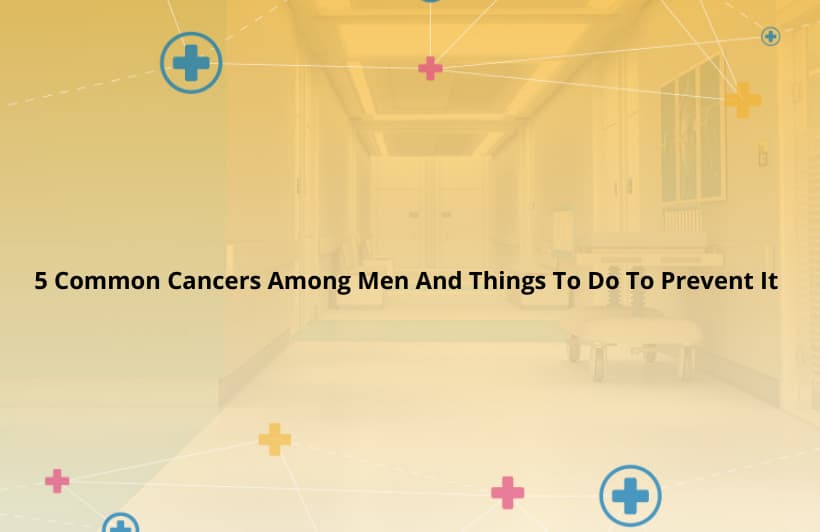
25 Jan, 2022

25 Jan, 2022
We are marking International Men’s Day on November 19th, and there is no better time than now to emphasise men’s health. Through our research over years, we have found that men generally pay less attention to their health when compared to women.
Thanks to factors like poor lifestyle habits, genetics, environment or even behavioural issues, cancer is becoming more prevalent among our population in recent times. Statistics indicate that men are more prone to certain types of cancers compared to women.
Oncologists insist on regular screening for cancers after crossing 40s for not only detecting the presence of tumour cells, if any but also for adopting greater lifestyle changes, for ultimately preventing various types of cancers.
The following are the 5 most common cancers that are being widely detected among men across the world.
Prostate cancer occurs in the prostate, a small walnut-shaped gland present in men. The primary functions of this gland include producing seminal fluid, nourishing and transporting sperm, and it is located below the urinary bladder, in front of the rectum. Seminal vesicles, present just behind the prostate gland, produce most of the semen, and the urethra, which transports urine and sperm out of the body, passes through the centre of the prostate gland. The prostate gland undergoes many changes as men age. While it is the size of a walnut in younger men, it appears enlarged in older men.
The uncontrollable growth of cancer cells in this gland is known as prostate cancer.
There is no definite reason behind prostate cancer; however, doctors believe the changes in DNA can trigger cancer formation.
The majority of prostate cancers are adenocarcinomas, which develop from the gland cells. However, there are other types of cancers, including small cell carcinomas, transitional cell carcinomas, neuroendocrine tumours and sarcomas that can originate in the gland itself.
Lungs are one of the vital organs in the human body, which are responsible for inhalation of oxygen, transport of oxygen into the bloodstream and exhalation of carbon dioxide. Lung cancer is one of the most common cancers detected in our country, mostly among men, who have been smokers for a long time. Lung cancer can occur in any part of the lungs, spreading to lymph nodes and other parts of the body, if not treated on time. Other risk factors include second-hand or passive smoking, exposure to radon gas, asbestos, environmental factors, weaker lungs or pre-existing lung conditions.
The two main types of lung cancers are Small Cell Lung Cancer (SCLC) and Non-Small Cell Lung Cancer (NSCLC).
Bladder cancer is another commonly detected type of cancer among men. The bladder, the hollow muscular organ located in the lower abdomen, stores urine and the growth of cancerous cells usually begins in the urothelial cells, lining inside the bladder. Bladder cancer, if diagnosed at early stages, can be treated swiftly. Risk factors include smoking as the carcinogenic components pass into the bloodstream settling down in the urine, exposure to harsh chemicals, drinking water laced with arsenic, genetic factors, being male and having a family history of bladder cancer.
Cancer of the colon (intestine) or rectum is called colorectal cancer. This condition starts when cancer cells grow out of control either in the colon or in the rectum. Most colorectal cancers start as polyps on the inner lining of the colon or rectum.
They are categorised into adenomatous polyps, hyperplastic polyps and sessile serrated polyps. When these polyps grow outwards, spreading into blood vessels, lymph nodes and other parts of the body, it means cancer has metastasised. Risk factors include obesity, lack of dietary fibres, consumption of alcohol and tobacco and genetics.
Melanoma is a rare but serious type of skin cancer that mostly affects men above the age of 65. This skin cancer type develops in the cells that make melanin. It is diagnosed three times more in men than women. Though the exact cause of melanoma is yet to be known, it is often indicative of excessive exposure to ultraviolet rays from sunlight, tanning lamps and genetics.
So, these are the 5 common cancers among men. Staying aware of the symptoms and considering regular screening are two ways to detect these cancers in their early stages when they can be treated in the best possible way.
For any information on cancer treatment at HCG and the best oncologists available, please reach out to us on +919513165955 or fill your query form here.